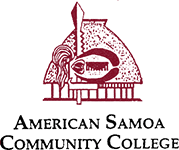American Samoa Community College MOODLE
15 Week Session
This course surveys the field of children’s literature. The course will explore all types of children’s literature including genre studies such as fiction and nonfiction, poetry, and fantasy. This class will also explore the history of children’s literature as well as principles of child development. It also examines how to use children’s books effectively ranging from the communicative process to a mastery of book selections. (Note: 3 lecture credits)
- Teacher: Katerina Ameperosa
This course presents the basic principles of child development and learning. Research, theories, and ideologies emphasizing methodologies and pedagogies that contribute to the educational growth of the child will be examined. The course will explore techniques, support mechanisms, and effective roles recommended for the Samoan classroom. In addition, the course will provide knowledge of appropriate modifications relevant to diversity in the learning environment. (Note: 3 lecture credits)
- Teacher: Moresa Langkilde
This course provides concepts and reasoning for elementary mathematics education. It will focus on methods and materials for teaching elementary school mathematics. Case studies and instructional technology will be utilized to illustrate K-8 mathematics curriculum and pedagogy. ED 330 includes a school-based practicum to educate pre-service and in-service teachers about K-8 Mathematics curriculum and pedagogy. (Note: 3 lecture credits)
- Teacher: Faaletaua Saili
This course is a field observation, training, and practical requirement for all students in the B.Ed. program. Students are involved in applying skills/content learned in their work in elementary schools as pre-professionals under the guidance and supervision of the ASCC Field Coordinator, Teacher Education faculty, and K-8 school system cooperating teachers. A minimum of five hours per week is required in conjunction with professional education courses. This course also requires a 15-hour seminar component for expected field training course work and the monitoring of the field training experience. (Note: 1 practicum credit)
- Teacher: Faaletaua Saili
This course seeks to help children acquire the knowledge, attitudes, and skills essential to science and technology literacy. This course has as its focus the methods and materials for teaching elementary school science. Emphasized are the content of elementary science, and the methods and materials useful to teach it. ED 335 uses readings, cases studies, instructional technology, and includes a school-based practicum to educate pre-service and in-service teachers about K-8 science curriculum and pedagogy. (Note: 3 lecture credits)
- Teacher: Katerina Ameperosa
This course is a field observation, training, and practical requirement for all students the B.Ed. program. Students are involved in applying skills/content learned in their work in elementary schools as pre-professionals under the guidance and supervision of the ASCC Field Coordinator, Teacher Education faculty, and K-8 school system cooperating teachers. A minimum of five hours per week is required in conjunction with professional education courses. This course also requires a 15-hour seminar component for expected field training course work and the monitoring of the field training experience. (Note: 1 practicum credits)
- Teacher: Katerina Ameperosa
This course examines the basic knowledge on the use of measurements and evaluation in the educational process. Primary focus will be given to the theoretical foundations of testing and measurement development and its practical application in the construction and evaluation of tests. Assessment and the use of rubrics will also be explored. (Note: 4 lecture credits.)
- Teacher: Moresa Langkilde
This course will identify the basic motor skills by examining current research on physical fitness and health. Both pre-service and in-service students will demonstrate physical activities that are appropriate for the growing child. Students will learn about different health behaviors to help children create a pre-intervention healthy life. Students will strengthen their teaching skills by warming up, playing with, supervising, demonstrating, and motivating students to live a holistically healthy life style. (Note: 3 lecture credits)
- Teacher: Katerina Ameperosa
